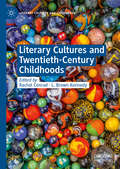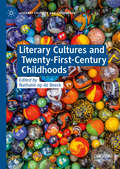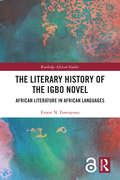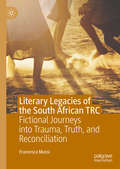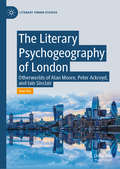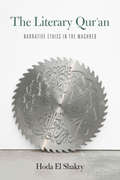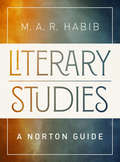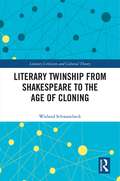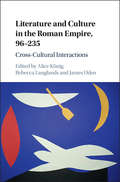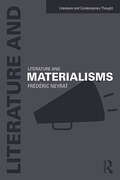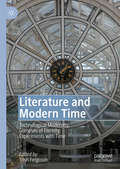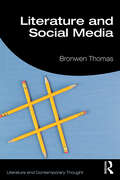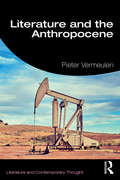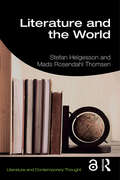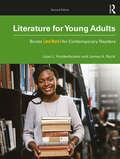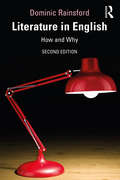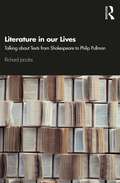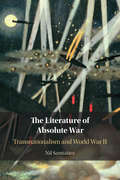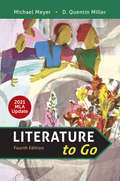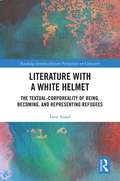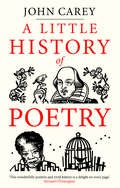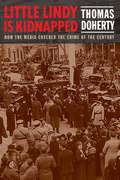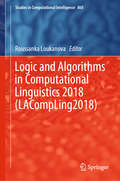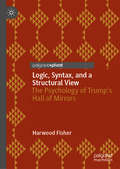- Table View
- List View
Literary Cultures and Twentieth-Century Childhoods (Literary Cultures and Childhoods)
by Rachel Conrad L. Brown KennedyThis collection of essays offers innovative methodological and disciplinary approaches to the intersection of Anglophone literary cultures with children and childhoods across the twentieth century. In two acts of re-centering, the volume focuses both on the multiplicity of childhoods and literary cultures and on child agency. Looking at classic texts for young audiences and at less widely-read and unpublished material (across genres including poetry, fiction, historical fiction or biography, picturebooks, and children’s television), essays foreground the representation of child voices and subjectivities within texts, explore challenges to received notions of childhood, and emphasize the role of child-oriented texts in larger cultural and political projects. Chapters frame themes of spectacle, self, and specularity across the twentieth-century; question tropes of childhood; explore identity and displacement in narrating history and culture; and elevate children as makers of literary culture. A major intent of the volume is to approach literary culture not just as produced by adults for consumption by children but also as co-created by young people through their actions as speakers, artists, readers, and writers.
Literary Cultures and Twenty-First-Century Childhoods (Literary Cultures and Childhoods)
by Nathalie op de BeeckIn the early decades of the twenty-first century, we are grappling with the legaciesof past centuries and their cascading effects upon children and all people. Werealize anew how imperialism, globalization, industrialization, and revolutioncontinue to reshape our world and that of new generations. At a volatile moment,this collection asks how twenty-first century literature and related mediarepresent and shape the contemporary child, childhood, and youth.Because literary representations construct ideal childhoods as well as model therights, privileges, and respect afforded to actual young people, this collectionsurveys examples from popular culture and from scholarly practice. Chaptersinvestigate the human rights of children in literature and international policy; thepotential subjective agency and power of the child; the role models proposed foryoung people; the diverse identities children embody and encounter; and theenvironmental well-being of future human and nonhuman generations.As a snapshot of our developing historical moment, this collection identifiesemergent trends, considers theories and critiques of childhood and literature,and observes how new technologies and paradigms are destabilizing pastconventions of storytelling and lived experience.
The Literary History of the Igbo Novel: African Literature in African Languages (Routledge African Studies)
by Ernest N. EmenyonuThis book looks at the trends in the development of the Igbo novel from its antecedents in oral performance, through the emergence of the first published novel, Omenuko, in 1933 by Pita Nwana, to the contemporary Igbo novel. Defining "Igbo literature" as literature in Igbo language, and "Igbo novel" as a novel written in Igbo language, the author argues that oral and written literature in African indigenous languages hold an important foundational position in the history of African literature. Focusing on the contributions of Igbo writers to the development of African literature in African languages, the book examines the evolution, themes, and distinctive features of the Igbo novel, the historical circumstances of the rise of the African novel in the pre-colonial, era and their impact on the contemporary Igbo novel. This book will be of interest to scholars of African literature, literary history, and Igbo studies.
Literary Legacies of the South African TRC: Fictional Journeys into Trauma, Truth, and Reconciliation
by Francesca MussiSince the 1970s, truth and reconciliation commissions have become increasingly popularised as options for addressing historical injustices, especially within the context of dictatorial regimes. Of the many truth commissions to date, the South African TRC has been the one that has captured public attention throughout the world, providing a model for subsequent truth commissions. The South African TRC has also constituted and still constitutes an intriguing source for writing. Literary Legacies of the South African TRC explores the capacities of fiction for providing the TRC and people’s testimonies with a productive afterlife, for challenging definitions of trauma, truth and reconciliation, for inviting readers to keep the dialogue about the past open, and to think actively about the strategies adopted in addressing that past and their implications in the present. It explores these capabilities as evidenced in the work of a wide range of writers, some known to international Anglophone readers, including J.M. Coetzee and Nadine Gordimer, some less well-known, including Afrikaans-language novelist Marlene van Niekerk, and others from a new generation including Marli Roode, Kopano Matlwa, and Thando Mgqolozana. The book aims to contribute to discourses of trauma, truth-telling, and reconciliation from a literary perspective, as well as placing emphasis on the profound interconnection between fiction, history, and trauma in conflict and post-conflict areas such as South Africa.
The Literary Psychogeography of London: Otherworlds of Alan Moore, Peter Ackroyd, and Iain Sinclair (Literary Urban Studies)
by Ann TsoThis Pivot book examines literary elements of urban topography that have animated Alan Moore, Peter Ackroyd, and Iain Sinclair’s respective representations of London-ness. Ann Tso argues these authors write London “psychogeographically” to deconstruct popular visions of London with colonial and neoliberal undertones. Moore’s psychogeography consists of bird’s-eye views that reveal the brute force threatening to unravel Londonscape from within; Ackroyd’s aims to detect London sensuously, since every new awareness recalls an otherworldly London; Sinclair’s conjures up a narrative consciousness made erratic by London’s disunified landscape. Drawing together the dystopian, the phenomenological, and the postcolonial, Tso explores how these texts characterize “London-ness” as estranging.
The Literary Qur'an: Narrative Ethics in the Maghreb
by Hoda El ShakryThe novel, the literary adage has it, reflects a world abandoned by God. Yet the possibilities of novelistic form and literary exegesis exceed the secularizing tendencies of contemporary literary criticism. Showing how the Qurʾan itself invites and enacts critical reading, Hoda El Shakry’s Qurʾanic model of narratology enriches our understanding of literary sensibilities and practices in the Maghreb across Arabophone and Francophone traditions. The Literary Qurʾan mobilizes the Qurʾan’s formal, narrative, and rhetorical qualities, alongside embodied and hermeneutical forms of Qurʾanic pedagogy, to theorize modern Maghrebi literature. Challenging the canonization of secular modes of reading that occlude religious epistemes, practices, and intertexts, it attends to literature as a site where the process of entextualization obscures ethical imperatives. Engaging with the Arab-Islamic tradition of adab—a concept demarcating the genre of belles lettres, as well as social and moral comportment—El Shakry demonstrates how the critical pursuit of knowledge is inseparable from the spiritual cultivation of the self.Foregrounding form and praxis alike, The Literary Qurʾan stages a series of pairings that invite paratactic readings across texts, languages, and literary canons. The book places twentieth-century novels by canonical Francophone writers (Abdelwahab Meddeb, Assia Djebar, Driss Chraïbi) into conversation with lesser-known Arabophone ones (Maḥmūd al-Masʿadī, al-Ṭāhir Waṭṭār, Muḥammad Barrāda). Theorizing the Qurʾan as a literary object, process, and model, this interdisciplinary study blends literary and theological methodologies, conceptual vocabularies, and reading practices.
Literary Studies: A Norton Guide
by M.A.R. HabibAn inspiring and practical introduction to the English major Literary Studies provides students with an accessible overview of everything they need to know to succeed in their English courses—literary terms, historical periods, theoretical approaches, and more. The guide helps students gain the analytical skills that will benefit them in college and as educated citizens after graduation.
Literary Twinship from Shakespeare to the Age of Cloning (Literary Criticism and Cultural Theory)
by Wieland SchwanebeckUnlike previous efforts that have only addressed literary twinship as a footnote to the doppelganger motif, this book makes a case for the complexity of literary twinship across the literary spectrum. It shows how twins have been instrumental to the formation of comedies of mistaken identity, the detective genre, and dystopian science fiction. The individual chapters trace the development of the category of twinship over time, demonstrating how the twin was repeatedly (re-)invented as a cultural and pathological type when other discursive fields constituted themselves, and how its literary treatment served as the battleground for ideological disputes: by setting the stage for debates regarding kinship and reproduction, or by partaking in discussions of criminality, eugenic greatness, and ‘monstrous births’. The book addresses nearly 100 primary texts, including works of Mary Elizabeth Braddon, Wilkie Collins, Charles Dickens, Arthur Conan Doyle, Aldous Huxley, Christopher Priest, William Shakespeare, and Zadie Smith.
Literature and Culture in the Roman Empire, 96–235: Cross-Cultural Interactions
by Alice König Rebecca Langlands James UdenThis book explores new ways of analysing interactions between different linguistic, cultural, and religious communities across the Roman Empire from the reign of Nerva to the Severans (96–235 CE). Bringing together leading scholars in classics with experts in the history of Judaism, Christianity and the Near East, it looks beyond the Greco-Roman binary that has dominated many studies of the period, and moves beyond traditional approaches to intertextuality in its study of the circulation of knowledge across languages and cultures. Its sixteen chapters explore shared ideas about aspects of imperial experience - law, patronage, architecture, the army - as well as the movement of ideas about history, exempla, documents and marvels. As the second volume in the Literary Interactions series, it offers a new and expansive vision of cross-cultural interaction in the Roman world, shedding light on connections that have gone previously unnoticed among the subcultures of a vast and evolving Empire.
Literature and Materialisms (Literature and Contemporary Thought)
by Frederic NeyratLiterature and Materialisms sheds light on the current new wave of materialisms and assesses the impact on literary theory and criticism. It maps the similarities and differences between speculative realism, object-oriented philosophy, and vitalism. A genealogy of materialisms, vitalisms, empiricisms, and realist approaches - from Heraclitus to Badiou, including Lucretius, Spinoza, Marx, Althusser, Barad, Spivak, Deleuze, Bennett, Harman, and other contemporary thinkers - puts these new trends into perspective. This book investigates the relations between literature – from Marquis de Sade to objectivist poetry - and materialism and analyses the material aspects of literature, its structure and texture, its commodification and its capacity to resist market imperatives. It explores how literary style might be understood as a mediation between the ‘immaterial’ and the concrete features of a text. This volume provides students and academics with an accessible overview of the study of literature and materialism.
Literature and Modern Time: Technological Modernity; Glimpses of Eternity; Experiments with Time
by Trish FergusonLiterature and Modern Time is a collection of essays that explore literature in the context of a wave of challenges to linear conceptions of time introduced by thinkers such as Bergson, Einstein, McTaggart, Freud and Nietzsche. These challenges were not uniform in character. The volume will demonstrate that literature of the era under scrutiny was not simply reacting to new theories of time—in some cases it is actually inspiring and anticipating them. Thus Literature and Modern Time promises to offer a genuine dialogue between literature and time theory and in doing so will uncover and examine influences and connections— sometimes unexpected—between philosophers and writers of the era. It will examine literary attempts to transcend and escape time and also challenge rupture-based accounts of modernist time by demonstrating that literary texts commonly associated with brokenness, decline or stasis, also, at the same time, maintain faith in healing, renewal and mobility.This collection contains interdisciplinary research of the quite highest kind - to see so many different kinds of time - narrative, historical, mechanical, subjective, non-linear time, myth and nostalgia - as well as time/space discussed here is very stimulating indeed.Professor Simon James
Literature and Social Media (Literature and Contemporary Thought)
by Bronwen ThomasFrom Instapoetry to BookTube, contemporary literary cultures and practices are increasingly intertwined with social media. In this lively and wide-ranging study, Bronwen Thomas explores how social media provides new ways of connecting with and rediscovering established literary works and authors while also facilitating the emergence of unique and distinctive forms of creative expression. The book takes a 360˚ approach to the subject, combining analysis of current forms and practices with an examination of how social media fosters ongoing collaborative discourse amongst both informal and formal literary networks, and demonstrating how the participatory practices of social media have the potential to radically transform how literature is produced, shared and circulated. The first study of its kind to focus specifically on social media, Literature and Social Media provides a timely and engaging account of the state of the art, while interrogating the rhetoric that so often accompanies discussion of the ‘new’ in this context.
Literature and the Anthropocene (Literature and Contemporary Thought)
by Pieter VermeulenThe Anthropocene has fundamentally changed the way we think about our relation to nonhuman life and to the planet. This book is the first to critically survey how the Anthropocene is enriching the study of literature and inspiring contemporary poetry and fiction. Engaging with topics such as genre, life, extinction, memory, infrastructure, energy, and the future, the book makes a compelling case for literature’s unique contribution to contemporary environmental thought. It pays attention to literature’s imaginative and narrative resources, and also to its appeal to the emotions and its relation to the material world. As the Anthropocene enjoins us to read the signals the planet is sending and to ponder the traces we leave on the Earth, it is also, this book argues, a literary problem. Literature and the Anthropocene maps key debates and introduces the often difficult vocabulary for capturing the entanglement of human and nonhuman lives in an insightful way. Alternating between accessible discussions of prominent theories and concise readings of major works of Anthropocene literature, the book serves as an indispensable guide to this exciting new subfield for academics and students of literature and the environmental humanities.
Literature and the World (Literature and Contemporary Thought)
by Stefan Helgesson Mads Rosendahl ThomsenLiterature and the World presents a broad and multifaceted introduction to world literature and globalization. The book provides a brief background and history of the field followed by a wide spectrum of exemplary readings and case studies from around the world. Amongst other aspects of World Literature, the authors look at: New approaches to digital humanities and world literature Ecologies of world literature Rethinking geography in a globalized world Translation Race and political economy Offering state of the art debates on world literature, this volume is a superb introduction to the field. Its critically thoughtful approach makes this the ideal guide for anyone approaching World Literature.
Literature for Young Adults: Books (and More) for Contemporary Readers
by Joan L. Knickerbocker James A. RycikNow in its second edition, this book explores a great variety of genres and formats of young adult literature while placing special emphasis on contemporary works with nontraditional themes, protagonists, and literary conventions that are well suited to young adult readers. It looks at the ways in which contemporary readers can access literature and share the works they're reading, and it shows teachers the resources that are available, especially online, for choosing and using good literature in the classroom and for recommending books for their students’ personal reading. In addition to traditional genre chapters, this book includes chapters on literary nonfiction; poetry, short stories, and drama; and film. Graphic novels, diversity issues, and uses of technology are also included throughout the text. The book's discussion of literary language—including traditional elements as well as metafictive terms—enables readers to share in a literary conversation with their peers (and others) when communicating about books. This book is an essential resource for preservice educators to help young adults understand and appreciate the excellent literature that is available to them. New to the second edition: New popular authors, books, and movies with a greater focus on diversity of literature Updated coverage of new trends, such as metafiction, a renewed focus on nonfiction, and retellings of canonical works Increased attention to graphic novels and multimodal texts throughout the book eResources with downloadable materials, including book lists, awards lists, and Focus Questions
Literature in English: How and Why
by Dominic RainsfordLiterature in English: How and Why is an accessible guide for students. It deals with the fundamental concepts of literary form and genre; the history of English-language literature from the medieval period to the present; relations between the study of literature and other disciplines; literary theory; researching a topic; and writing a paper. The new edition contains a brand new chapter which takes literary theory to another level, using it to link literature to the issues that concern us most, whether in our own lives or in the UN’s Sustainable Development Goals. The book has also been fully updated throughout, with significant additions to the introduction and further reading sections. Overall, Literature in English: • Grounds the study of literature throughout by referencing a selection of well-known novels, plays and poems • Examines the central questions that readers ask when confronting literary texts, and shows how these make literary theory meaningful and necessary • Links British, American and postcolonial literature into a coherent whole • Discusses film as literature and provides the basic conceptual tools needed to study film within a literature-course framework • Places particular emphasis on interdisciplinarity by examining the connections between the study of literature and other disciplines • Links literary theory to current global challenges, placing special emphasis on new and evolving approaches such as ecocriticism, new materialism, and the spatial turn • Provides extensive guidance on further reading. Written in a clear and engaging style, this is an essential guide for literature students around the world.
Literature in our Lives: Talking About Texts from Shakespeare to Philip Pullman
by Richard JacobsThis book recreates in written form seventeen of the most popular, frankly personal and engaging lectures on literature given by the award-winning teacher Richard Jacobs, who has been working with students for over forty years. This is a book written for students, whether starting their studies or more experienced, and also for all lovers of literature. At its heart is the conviction that reading, thinking about, and writing or talking about literature involves us all personally: texts talk to us intimately and urgently, inviting us to talk back, intervening in and changing our lives. These lectures discuss, in an open but richly informed way, a wide range of texts that are regularly studied and enjoyed. They model what it means to be excited about reading and studying literature, and how the study of literature can be life-changing - perhaps even with the effect of changing the lives of readers of this eloquent and remarkable book.
The Literature of Absolute War: Transnationalism and World War II
by Nil SantiáñezThis book explores for the first time the literature of absolute war in connection to World War II. From a transnational and comparative standpoint, it addresses a set of theoretical, historical, and literary questions, shedding new light on the nature of absolute war, the literature on the world war of 1939–45, and modern war writing in general. It determines the main features of the language of absolute war, and how it gravitates around fundamental semantic clusters, such as the horror, terror, and the specter. The Literature of Absolute War studies the variegated responses given by literary authors to the extreme and seemingly unsolvable challenges posed by absolute war to epistemology, ethics, and language. It also delves into the different poetics that articulate the writing on absolute war, placing special emphasis on four literary practices: traditional realism, traumatic realism, the fantastic, and catastrophic modernism.
Literature to Go with 2021 MLA Update
by Michael Meyer D. Quentin MillerThis ebook has been updated to provide you with the latest guidance on documenting sources in MLA style and follows the guidelines set forth in the MLA Handbook, 9th edition (April 2021).Drawn from our best-selling anthology The Compact Bedford Introduction to Literature, Literature to Go is a brief and inexpensive collection of stories, poems, and plays accompanied by thorough critical reading and writing support.
Literature with A White Helmet: The Textual-Corporeality of Being, Becoming, and Representing Refugees (Routledge Interdisciplinary Perspectives on Literature)
by Lava AsaadLiterature with A White Helmet explores issues of refugee writers, contemporary works of fiction and nonfiction on the refugee’s body and experience, the biopolitics of refugees, and disputes over the ethicality of representing refugees by writers and human rights activists. The book relies on a broad selection of texts by authors who, in one way or another, have experienced displacement, witnessed it, imagined it, or co-written about it.
Little Bird and the Bath (Into Reading, Level D #57)
by Eve Browne Melissa WebbNIMAC-sourced textbook
A Little History of Poetry (Little Histories)
by John CareyA vital, engaging, and hugely enjoyable guide to poetry, from ancient times to the present, by one of our greatest champions of literature What is poetry? If music is sound organized in a particular way, poetry is a way of organizing language. It is language made special so that it will be remembered and valued. It does not always work—over the centuries countless thousands of poems have been forgotten. This little history is about some that have not. John Carey tells the stories behind the world&’s greatest poems, from the oldest surviving one written nearly four thousand years ago to those being written today. Carey looks at poets whose works shape our views of the world, such as Dante, Chaucer, Shakespeare, Whitman, and Yeats. He also looks at more recent poets, like Derek Walcott, Marianne Moore, and Maya Angelou, who have started to question what makes a poem "great" in the first place. This little history shines a light on the richness and variation of the world&’s poems—and the elusive quality that makes them all the more enticing.
Little Lindy Is Kidnapped: How the Media Covered the Crime of the Century
by Thomas DohertyThe biggest crime story in American history began on the night of March 1, 1932, when the twenty-month-old son of Charles and Anne Lindbergh was snatched from his crib in Hopewell, New Jersey. The news shocked a nation enthralled with the aviator, the first person to fly solo nonstop across the Atlantic. American law enforcement marshalled all its resources to return “Little Lindy” to the arms of his parents—and perhaps even more energized were the legions of journalists catering to a public whose appetite for Lindbergh news was insatiable.In Little Lindy Is Kidnapped, Thomas Doherty offers a lively and comprehensive cultural history of the media coverage of the abduction and its aftermath. Beginning with Lindbergh’s ascent to fame and proceeding through the trial and execution of the accused kidnapper, Doherty traces how newspapers, radio, and newsreels reported on what was dubbed the “crime of the century.” He casts the affair as a transformative moment for American journalism, analyzing how the case presented new challenges and opportunities for each branch of the media in the days before the rise of television. Coverage of the Lindbergh story, Doherty reveals, set the template for the way the media would treat breaking news ever after. An engrossing account of an endlessly fascinating case, Little Lindy Is Kidnapped sheds new light on an enduring quality of journalism ever since: the media’s eye on a crucial part of the story—itself.
Logic and Algorithms in Computational Linguistics 2018 (Studies in Computational Intelligence #860)
by Roussanka LoukanovaThis book focuses mainly on logical approaches to computational linguistics, but also discusses integrations with other approaches, presenting both classic and newly emerging theories and applications.Decades of research on theoretical work and practical applications have demonstrated that computational linguistics is a distinctively interdisciplinary area. There is convincing evidence that computational approaches to linguistics can benefit from research on the nature of human language, including from the perspective of its evolution.This book addresses various topics in computational theories of human language, covering grammar, syntax, and semantics. The common thread running through the research presented is the role of computer science, mathematical logic and other subjects of mathematics in computational linguistics and natural language processing (NLP). Promoting intelligent approaches to artificial intelligence (AI) and NLP, the book is intended for researchers and graduate students in the field.
Logic, Syntax, and a Structural View: The Psychology of Trump's Hall of Mirrors
by Harwood FisherThis book presents a new structural approach to the psychology of the person, inspired by Kenneth Colby’s computer-generated simulation, PARRY. The simulation was of a paranoid psychological state, represented in forms of the person's logic and syntax, as these would be evidenced in personal communication. Harwood Fisher uses a Structural View to highlight similarities in the logical form of the linguistic representations of Donald Trump, his avid followers (“Trumpers”), and the paranoid—referred to as “The Trio.” He demonstrates how the Structural View forms a series of logical and schematic patterns, similar to the way that content analysis can bring forth associations meanings, and concepts held in the text. Such comparisons, Fisher argues, can be used to shed light on contingencies for presenting, representing, and judging truth. Specifically, Fisher posits that the major syntactic and logical patterns that were used to produce the computer-generated “paranoid” responses in Colby’s project can be used to analyze Donald Trump’s rhetoric and his followers’ reactions to it. Ultimately, Fisher offers a new kind of structural approach for the philosophy of psychology. This novel work will appeal to students and scholars of social and cognitive psychology, psychology of personality, psychiatric classification, psycholinguistics, rhetoric, and computer science.
